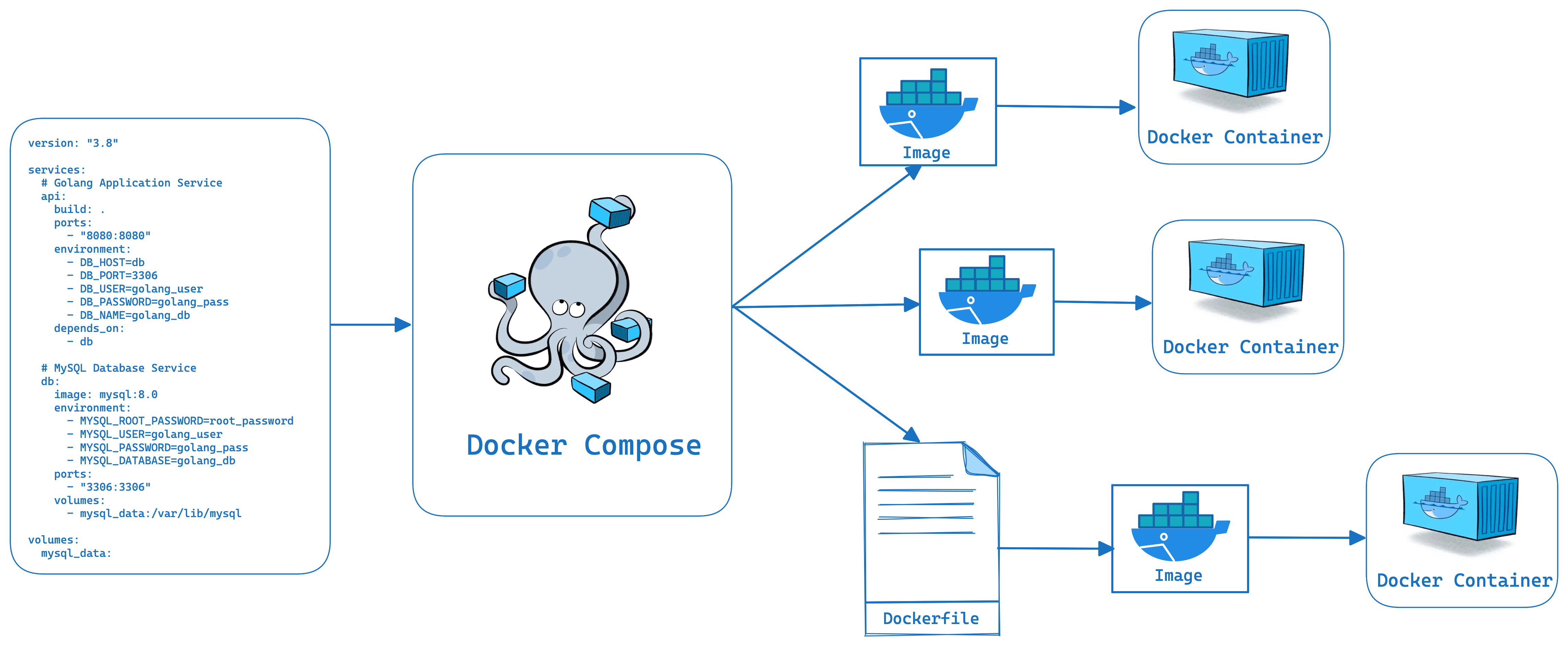Docker Compose - Coordinating the Crew 🚢
Welcome back to Docking the Ship: Navigating Docker for Developers! In the world of modern software development, containers have become the backbone of scalable and isolated applications. Docker, with its lightweight, portable containers, has revolutionized the way we deploy and manage applications. But what happens when your application requires multiple services that need to work together? This is where Docker Compose comes in—allowing you to define, run, and manage multi-container applications with ease.
In this blog post, we’ll explore Docker Compose and demonstrate how you can use it to manage a multi-container application built in Golang. We’ll break down how to write a docker-compose.yml file, manage various services, and run a multi-container application with MySQL as the database.
What is Docker Compose?
Docker Compose is a tool that allows you to define and manage multi-container applications using a simple YAML configuration file (docker-compose.yml). It abstracts away much of the complexity involved in managing multiple containers, making it easier to manage inter-service communication, networking, and even scaling services.
With Docker Compose, you can:
- Define services, networks, and volumes.
- Set up multi-container applications in an easy-to-understand manner.
- Manage everything with a single command.
Example Golang Application: A Simple Web API with MySQL
Let’s say we have a simple Golang web API that needs two services to run:
- The Golang API Service: A basic API that serves requests.
- A Database Service: In this case, we’ll use MySQL to store some simple data.
Without Docker Compose, you would have to manually run each container, configure network links, and handle dependencies by yourself. Docker Compose allows us to easily manage these services in a single file.
Let’s start
- You can clone the repository from here:
1
2
3
4
5
6
7
8
# Clone the repository
git clone https://github.com/vishalanarase/navigating-docker
# Change to the project directory
cd navigating-docker
# Checkout to the specific version
git checkout v1.2.0
File structure:
1
2
3
4
5
6
7
8
9
10
navigating-docker
├── Dockerfile
├── LICENSE
├── README.md
├── docker-compose.yaml
├── go.mod
├── go.sum
└── main.go
0 directories, 7 files
Step 1: Golang Application Code (API)
Create a simple Golang application in a file named main.go. This API will connect to MySQL and serve data:
1
2
3
4
5
6
7
8
9
10
11
12
13
14
15
16
17
18
19
20
21
22
23
24
25
26
27
28
29
30
31
32
33
34
35
36
37
38
39
40
41
42
43
44
45
46
47
48
49
50
51
52
53
54
55
56
package main
import (
"database/sql"
"fmt"
"log"
"net/http"
"os"
_ "github.com/go-sql-driver/mysql"
)
func dbConnection() (*sql.DB, error) {
// MySQL connection string
connStr := fmt.Sprintf("%s:%s@tcp(%s:%s)/%s",
os.Getenv("DB_USER"), os.Getenv("DB_PASSWORD"), os.Getenv("DB_HOST"),
os.Getenv("DB_PORT"), os.Getenv("DB_NAME"))
// Open MySQL database connection
db, err := sql.Open("mysql", connStr)
if err != nil {
log.Fatal(err)
}
defer db.Close()
// Test the database connection
err = db.Ping()
if err != nil {
log.Fatal(err)
}
return db, nil
}
func handler(w http.ResponseWriter, r *http.Request) {
// Connect to the database
db, err := dbConnection()
if err != nil {
http.Error(w, fmt.Sprintf("Error connecting to the database: %v", err), http.StatusInternalServerError)
return
}
defer db.Close()
_, err = w.Write([]byte("Hello, Golang API is connected to MySQL!"))
if err != nil {
log.Fatal(err)
}
}
func main() {
http.HandleFunc("/", handler)
fmt.Println("Starting server on :8081")
if err := http.ListenAndServe(":8081", nil); err != nil {
fmt.Printf("Error starting server: %v\n", err)
}
}
Step 2: Writing the Dockerfile for the Golang Application
To ensure your Golang application is containerized correctly, you’ll need a Dockerfile in the same directory. Here’s a simple Dockerfile to build the application:
1
2
3
4
5
6
7
8
9
10
11
12
13
14
15
16
17
18
19
20
21
22
23
24
25
26
27
28
29
30
# Stage 1: Build the Go application
FROM golang:1.23-alpine AS builder
# Set the working directory inside the container
WORKDIR /app
# Copy the Go module files and download dependencies
COPY go.mod go.sum ./
RUN go mod download
# Copy the rest of the application code
COPY . .
# Build the Go application
RUN go build -o webserver .
# Stage 2: Create the final runtime image
FROM alpine:latest
# Set the working directory inside the container
WORKDIR /app
# Copy the compiled Go binary from the builder stage
COPY --from=builder /app/webserver /app/webserver
# Expose the port the app runs on
EXPOSE 8081
# Command to run the application
CMD ["./webserver"]
Step 3: Define the docker-compose.yml
In the root of your Golang project, create a docker-compose.yml file. This file will contain all the necessary configurations to run both the Golang application and the MySQL database.
1
2
3
4
5
6
7
8
9
10
11
12
13
14
15
16
17
18
19
20
21
22
23
24
25
26
27
28
29
30
31
32
version: "3.8"
services:
# Golang Application Service
api:
build: .
ports:
- "8081:8081" # Map port 8080 from container to the host machine
environment:
- DB_HOST=db # Environment variable pointing to the database service
- DB_PORT=3306 # MySQL port
- DB_USER=api
- DB_PASSWORD=api_pass
- DB_NAME=api_db
depends_on:
- db # This ensures the db service starts before the api
# MySQL Database Service
db:
image: mysql:8.0
environment:
- MYSQL_ROOT_PASSWORD=password
- MYSQL_USER=api
- MYSQL_PASSWORD=api_pass
- MYSQL_DATABASE=api_db
ports:
- "3306:3306" # Expose MySQL port to host (optional, for testing)
volumes:
- mysql_data:/var/lib/mysql # Persistent data storage for MySQL
volumes:
mysql_data: # Named volume for persistent MySQL data storage
Breaking It Down:
- version: Defines the version of the Docker Compose file format. Here, we are using version
3.8, which is widely used and stable. - services:
- api: This service represents your Golang application. It is built from the current directory (
.), which should have aDockerfilefor the Golang app. The application will listen on port8081on the host machine. - db: This service runs a MySQL container. We use the official MySQL image from Docker Hub, setting the necessary environment variables for user, password, and database name. The data is persisted using a named volume
mysql_data.
- api: This service represents your Golang application. It is built from the current directory (
- depends_on: Ensures the
dbservice starts before theapiservice. Docker Compose will wait for the database container to be fully up before starting the API. - volumes: This section defines a persistent volume to store MySQL data. This is crucial for ensuring data persists even when containers are restarted.
Step 4: Running the Application with Docker Compose
Now that you have all the components in place, it’s time to run everything using Docker Compose!
Build the containers:
1
docker-compose build
Output
1
2
3
4
5
6
7
8
9
10
11
12
13
14
15
16
17
18
19
20
21
22
23
24
25
26
27
28
29
❯ docker-compose build
WARN[0000] /Users/vishal/workspace/vishalanarase/navigating-docker/docker-compose.yaml: the attribute `version` is obsolete, it will be ignored, please remove it to avoid potential confusion
[+] Building 1.8s (18/18) FINISHED docker:desktop-linux
=> [api internal] load build definition from Dockerfile 0.0s
=> => transferring dockerfile: 741B 0.0s
=> [api internal] load metadata for docker.io/library/alpine:latest 1.7s
=> [api internal] load metadata for docker.io/library/golang:1.23-alpine 1.7s
=> [api auth] library/alpine:pull token for registry-1.docker.io 0.0s
=> [api auth] library/golang:pull token for registry-1.docker.io 0.0s
=> [api internal] load .dockerignore 0.0s
=> => transferring context: 2B 0.0s
=> [api builder 1/6] FROM docker.io/library/golang:1.23-alpine@sha256:f8113c4b13e2a8b3a168dceaee88ac27743cc84e959f43b9dbd2291e9c3f57a0 0.0s
=> [api internal] load build context 0.0s
=> => transferring context: 13.28kB 0.0s
=> [api stage-1 1/3] FROM docker.io/library/alpine:latest@sha256:a8560b36e8b8210634f77d9f7f9efd7ffa463e380b75e2e74aff4511df3ef88c 0.0s
=> CACHED [api stage-1 2/3] WORKDIR /app 0.0s
=> CACHED [api builder 2/6] WORKDIR /app 0.0s
=> CACHED [api builder 3/6] COPY go.mod go.sum ./ 0.0s
=> CACHED [api builder 4/6] RUN go mod download 0.0s
=> CACHED [api builder 5/6] COPY . . 0.0s
=> CACHED [api builder 6/6] RUN go build -o webserver . 0.0s
=> CACHED [api stage-1 3/3] COPY --from=builder /app/webserver /app/webserver 0.0s
=> [api] exporting to image 0.0s
=> => exporting layers 0.0s
=> => writing image sha256:9a4061aa3b5a6b0e48561b19b6b20a91cb2e7cda164f4a1d6d3e834786432ad6 0.0s
=> => naming to docker.io/library/navigating-docker-api 0.0s
=> [api] resolving provenance for metadata file 0.0s
[+] Building 1/1
✔ api Built
Start the application:
1
docker-compose up
Output
1
2
3
4
5
6
7
8
9
10
11
12
13
14
15
16
17
18
19
20
21
22
23
24
25
26
27
28
29
30
31
32
33
❯ docker-compose up
WARN[0000] /Users/vishal/workspace/vishalanarase/navigating-docker/docker-compose.yaml: the attribute `version` is obsolete, it will be ignored, please remove it to avoid potential confusion
[+] Running 12/12
✔ db Pulled 3.9s
✔ 903087d703a7 Already exists 0.0s
✔ 9dcae24b624f Already exists 0.0s
✔ d1014e296527 Already exists 0.0s
✔ 5dd6251984b1 Already exists 0.0s
✔ e176816781e5 Already exists 0.0s
✔ 63ce6cde00d5 Already exists 0.0s
✔ 46a5e0bee806 Already exists 0.0s
✔ 6882305ba978 Already exists 0.0s
✔ 7678a5083faf Already exists 0.0s
✔ f41ddadd1084 Already exists 0.0s
✔ dd907af04cee Already exists 0.0s
[+] Running 2/2
✔ Container navigating-docker-db-1 Created 0.0s
✔ Container navigating-docker-api-1 Created 0.0s
Attaching to api-1, db-1
db-1 | 2025-02-21 05:51:30+00:00 [Note] [Entrypoint]: Entrypoint script for MySQL Server 8.0.41-1.el9 started.
db-1 | 2025-02-21 05:51:30+00:00 [Note] [Entrypoint]: Switching to dedicated user 'mysql'
db-1 | 2025-02-21 05:51:30+00:00 [Note] [Entrypoint]: Entrypoint script for MySQL Server 8.0.41-1.el9 started.
api-1 | Starting server on :8081
db-1 | '/var/lib/mysql/mysql.sock' -> '/var/run/mysqld/mysqld.sock'
db-1 | 2025-02-21T05:51:30.630482Z 0 [Warning] [MY-011068] [Server] The syntax '--skip-host-cache' is deprecated and will be removed in a future release. Please use SET GLOBAL host_cache_size=0 instead.
db-1 | 2025-02-21T05:51:30.630746Z 0 [System] [MY-010116] [Server] /usr/sbin/mysqld (mysqld 8.0.41) starting as process 1
db-1 | 2025-02-21T05:51:30.634230Z 1 [System] [MY-013576] [InnoDB] InnoDB initialization has started.
db-1 | 2025-02-21T05:51:30.715488Z 1 [System] [MY-013577] [InnoDB] InnoDB initialization has ended.
db-1 | 2025-02-21T05:51:30.785391Z 0 [Warning] [MY-010068] [Server] CA certificate ca.pem is self signed.
db-1 | 2025-02-21T05:51:30.785411Z 0 [System] [MY-013602] [Server] Channel mysql_main configured to support TLS. Encrypted connections are now supported for this channel.
db-1 | 2025-02-21T05:51:30.786530Z 0 [Warning] [MY-011810] [Server] Insecure configuration for --pid-file: Location '/var/run/mysqld' in the path is accessible to all OS users. Consider choosing a different directory.
db-1 | 2025-02-21T05:51:30.795153Z 0 [System] [MY-011323] [Server] X Plugin ready for connections. Bind-address: '::' port: 33060, socket: /var/run/mysqld/mysqlx.sock
db-1 | 2025-02-21T05:51:30.795161Z 0 [System] [MY-010931] [Server] /usr/sbin/mysqld: ready for connections. Version: '8.0.41' socket: '/var/run/mysqld/mysqld.sock' port: 3306 MySQL Community Server - GPL.
Your MySQL database is now running, and your Golang API is connected to it. You can access your API at http://localhost:8081.
1
2
❯ curl http://localhost:8081
Hello, Golang API is connected to MySQL!
Docker Compose will pull the MySQL image, build your Golang API container, and bring everything up. You can now access your API at http://localhost:8080. It will be connected to MySQL as defined in the docker-compose.yml file.
Conclusion
In this post, we demonstrated how to use Docker Compose to manage a multi-container application with MySQL. By defining services like a Golang API and MySQL database in a docker-compose.yml file, we were able to easily manage their orchestration, making it simpler to run and scale our application.
With Docker Compose, you’re not just simplifying container orchestration; you’re improving the overall developer experience. Whether you’re working on local development or testing your application, Docker Compose makes it easy to coordinate the various parts of your application like a well-organized crew.
Give it a try in your own projects, and let Docker Compose coordinate the crew of containers for you!
In the next post, we’ll explore Optimizing Dockerfiles: Sailing Faster for writing and optimizing Dockerfiles. Stay tuned, and happy docking! 🚢
Have questions or feedback? Drop them in the comments or connect with me. Let’s navigate the Docker seas together! 🌊

